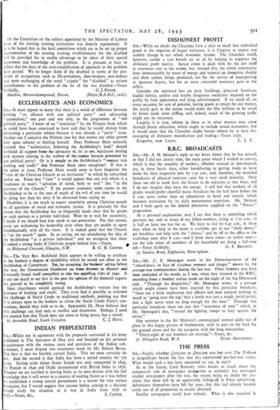DISHONEST PROFIT
Sta,—While no doubt the Churches have a duty to teach that individual greed is the negation of happy existence, it is Utopian to expect any sudden change in our whole economic system. The Churches could, however, confer a vast benefit on us all by helping to suppress the dishonest profit motive. Actual crime is dealt with by the law itself at enormous cost to the nation, but, beyond this, the entire community loses immeasurably by waste of energy and material on deceptive, shoddy and often useless things produced, not for the service of unsuspecting or ignorant buyers, but for an extra concealed monetary gain to the sellers.
Consider the universal loss on jerry buildings, gimcrack furniture, loaded fabrics, useless and maybe dangerous medicines imposed on the public by false appearance and lying advertisement. If we could all, on every occasion, be sure of genuine, lasting goods in return for our money, the yearly gain to the nation would make the fifty millions to be saved by better roads seem trifling, and, indeed, much of the growing traffic might not be necessary.
Largely, it is true, reform io these as in other matters may come through,better education, which ought to include sound economics, but it would seem that the Churches might hasten reform by at least dis- couraging all dishonest manufacture and trading.—Yours truly,


























 Previous page
Previous page